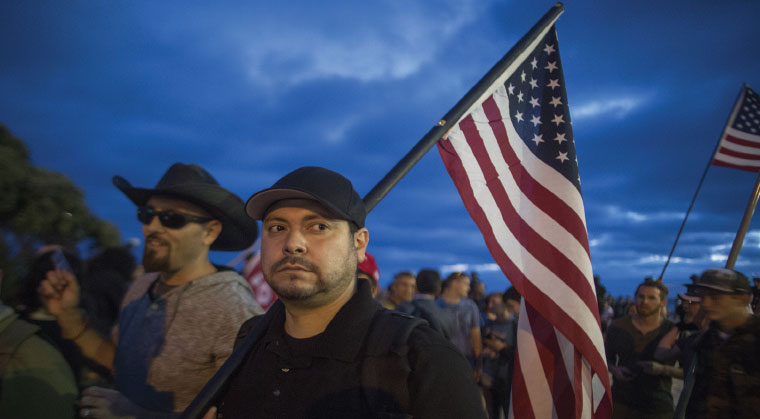A Bully Pulpit and Policy Vehicle


POPULAR CHOICE Orthodox askanim across the board have praised Trump’s appointment of Betsy DeVos as secretary designate of the Department of Education (Photos: AFP/Imagebank)
N either Donald Trump’s appointment of a strong advocate of school vouchers as education secretary nor his own campaign proposal to allocate $20 billion in federal education funds for vouchers will make an immediate dent in the tuition crisis.
But Orthodox askanim across the board have praised Trump’s appointment of Betsy DeVos as secretary-designate of the Department of Education.
“We are very excited” says Rabbi Avraham David (AD) Motzen national director of state relations for Agudath Israel of America who has worked closely with DeVos for more than a decade. “There’s still a lot of work to be done to see new programs introduced which must pass Congress. But she has been sensitive to our needs and we’ll have a seat at the table for the next few years. It’s a very positive development toward getting higher levels of aid for private school families.”
The Department of Education (DOE) is a cabinet-level agency that establishes policies on federal financial aid for education and distributes and monitors an annual budget of close to $70 billion. In the last fiscal year some $49 billion of that sum was allocated to three programs that also benefit yeshivah students: Pell grants which provide tuition assistance to low-income students; Title I grants for school districts with a high percentage of low-income students and the DOE’s Special Education program.
“Making sure that the private schools get their fair share of that funding is one of the challenges we have faced” Rabbi Motzen says.
Since the 1990s DeVos has been leading that battle fighting to expand school choice through vouchers and tax credits. She has chaired two organizations — the Alliance for School Choice and the American Federation for Children — to pursue that agenda in the face of powerful public school lobbies.
Overcoming Objections
She has experienced both successes and failures. DeVos is credited for the passage of Michigan’s first charter-school bill in 1993. Charter schools are essentially quasi-public schools that are not subject to the same academic restrictions as public schools theoretically freeing them to innovate though they accept public money.
DeVos failed in her effort to amend Michigan’s constitution to allow tax-credit scholarships and vouchers but was instrumental in the passage of Florida’s tax-credit scholarship program in 2001 that has enabled more than 50000 students to attend the school of their own choosing. Fifteen years later teachers’ unions are still fighting the program in court so far with little success. Maury Litwack director of state political affairs for the Orthodox Union (OU) who has also worked closely with DeVos says that previous education secretaries have used their platform as both a bully pulpit and a policy vehicle. He expects DeVos to be forceful in that regard.
“A secretary of education can come out and say ‘This is outrageous — tax credits are a program that’s helping thousands of children.’ A secretary of education can highlight that attending private school is not some sort of privilege it’s something many groups feel they must do from their perspective” Litwack says.
The biggest question mark for now is pinning down details on Trump’s campaign promise to allocate $20 billion in federal education funds for state block grants to provide vouchers for poor children to attend private schools. Trump says he will ask the states to ante up an additional $110 billion from their own coffers.

Maury Litwack: “You’re starting with someone who ‘gets’ the fact that our children are worth an investment by the American education system as much as any other child”
A school voucher program essentially gives parents a certain amount of money to spend on whichever public (or private) school they wish.
In a best-case scenario at least for parents of private school students the Washington Post suggests the $130 billion pool could provide an annual $12000 voucher for every needy school-aged child.
Children First
An innovation of this scope would face many hurdles not the least of which is Congress which holds the power of the purse.
Even though Trump will take the oath of office on January 20 with the wind of a Republican-controlled House and Senate on his back passing legislation of such Trumpian proportions would likely require Congress to make extensive changes in the Elementary and Secondary Education Act which already underwent major revisions at the end of 2015. It’s a time-consuming and daunting bureaucratic procedure. Any massive voucher program would also face stormy opposition from teachers’ unions and other public school advocates.
With such obstacles in place Litwack cautions patience.
“Everything in government is an uphill battle” Litwack says though he believes there are grounds for optimism based on the growth of charter schools against the odds. The National Charter School Research Center reports the US has 7000 charter schools a number that has grown 6% annually since 2009.
In Betty DeVos Orthodox Jews are looking forward to working with an advocate who has consistently put the needs of schoolchildren first and who has stood tall in the face of special interests that inherently oppose all school choice programs because they divert money from public schools. “You’re starting with someone who ‘gets’ the fact that our children are worth an investment by the American education system as much as any other child” Litwack says.
Rabbi Motzen contends that his experience with DeVos gives him confidence she will successfully navigate both the halls of Congress and her opposition.
“Everyone knows that she works across the aisle and is someone who gets things done” Rabbi Motzen says. “I am confident she will sit down and work well with various parties on a policy that sticks to President Trump’s agenda and comes up with policies that benefit parents and children.”
Oops! We could not locate your form.







